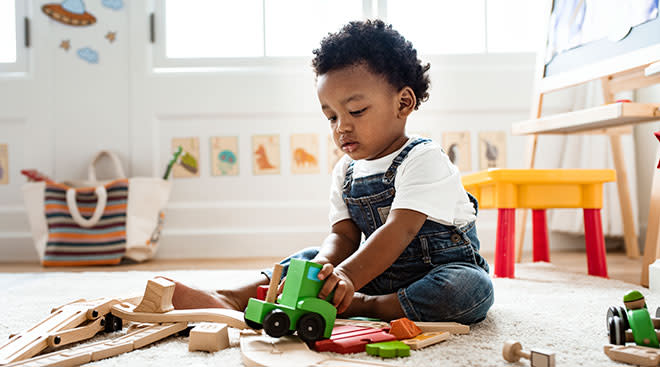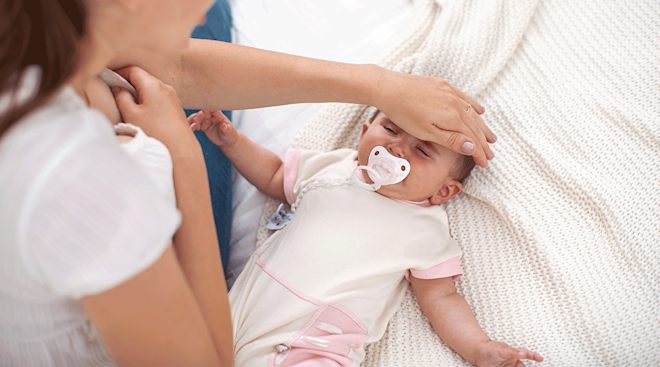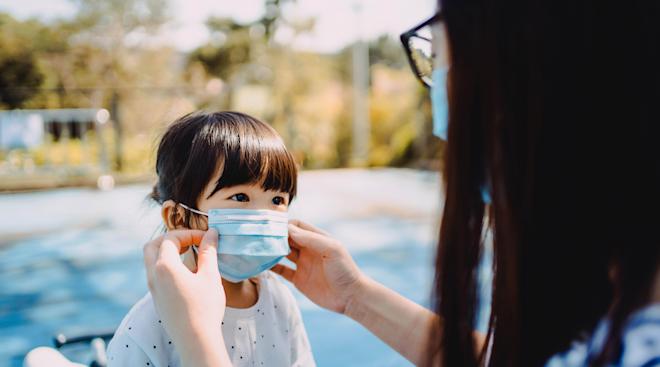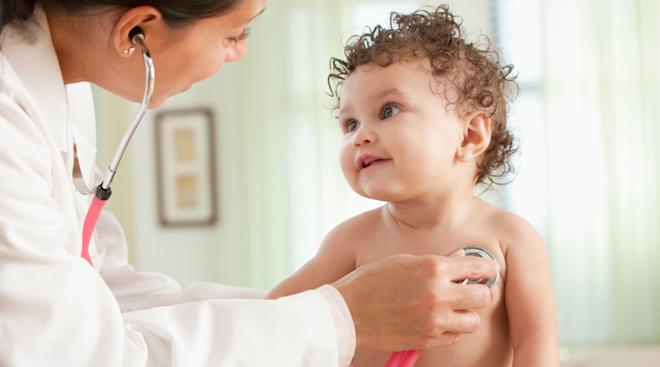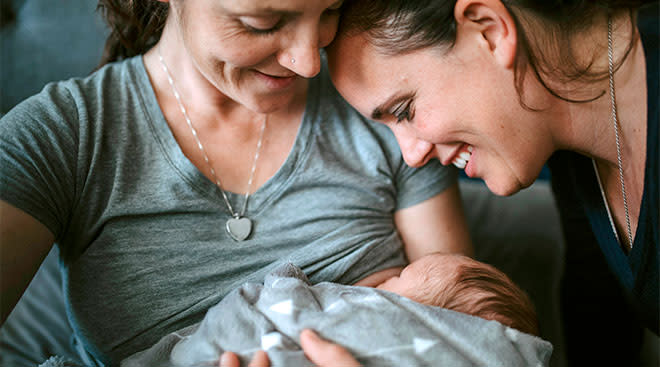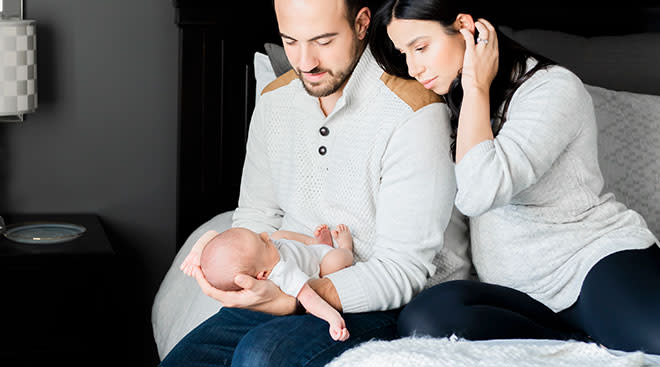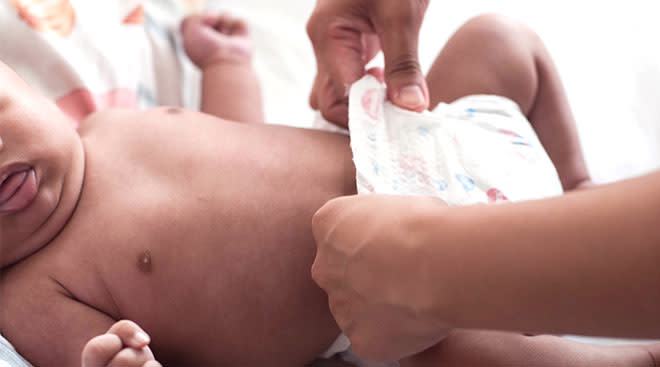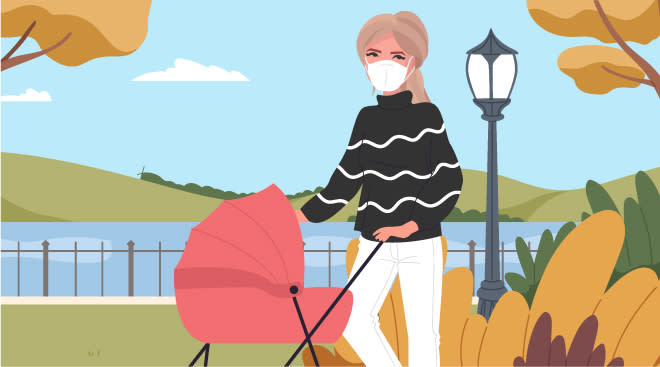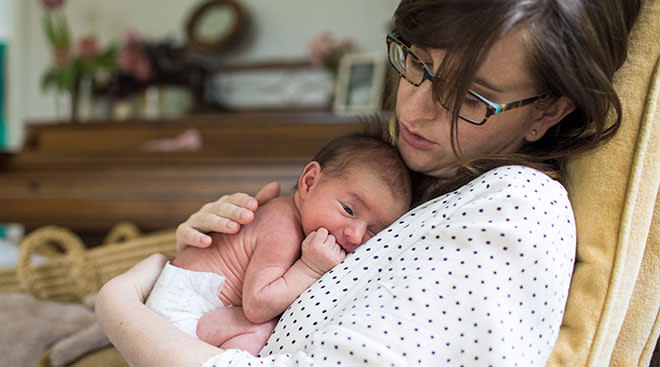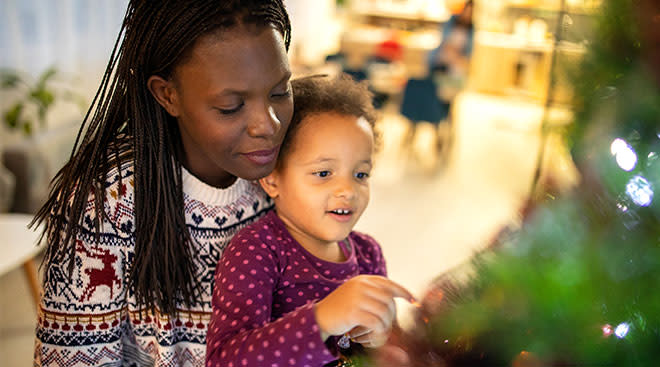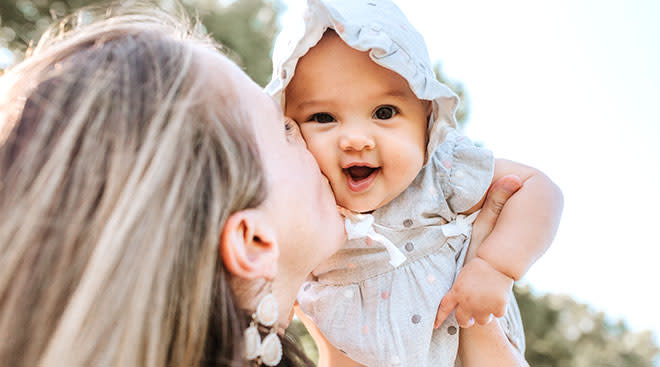How to Spot Postpartum Depression in Your Partner or Friend
Adjusting to life with a newborn is stressful in the best of times, but adapting to such change during a global pandemic adds another layer of worry when it comes to moms balancing their mental loads. That can make it even more challenging for people whose partners have recently given birth to decipher the new mother’s mental state: Is the weeping and moments of sadness simply due to baby blues or could it mark something more acute like postpartum depression?
Changes in a new mom’s mood can range from the imperceptible (becoming quiet more often) to the drastic (expressing that she feels like a failure as a mother and wife)—but both ends of this spectrum could indicate a disorder that calls for some type of treatment. So how do you know if a loved one is among the 10 to 15 percent of mothers in the US each year suffering from postpartum depression? It can be hard to detect, but there are a few signs to watch for, plus things you can do to help get her on a path to recovery.
The first step in knowing when and if a postpartum mood condition is affecting your partner or loved one: Preparing for it before it happens. The coronavirus outbreak is adding new mental challenges for postpartum women, who may be worried about exposure to the virus or decreased access to important physical resources like lactation support, according to Eynav Accortt, PhD, a clinical psychologist and assistant professor in the ob-gyn department at Cedars-Sinai Medical Center in Los Angeles. Given social distancing recommendations, the loss of face-to-face interactions with good friends—a social safety net that can help mothers work through what’s bothering them—can also worsen depression, she notes. That’s why it’s more important than ever to take stock of the mom-to-be’s moods in general—before she gives birth—and know what she’s like when she’s sad or depressed on a normal day, and encourage her to do the same self-reflection.
“We need to become more self-aware beforehand so we can notice changes in how we’re feeling postpartum and say, ‘hey, this is not how I usually feel, this is not how I usually function,’” says Alinne Barrera, PhD, a clinical psychologist and executive board member at 2020 Mom, a nonprofit dedicated to maternal mental health.
Have a conversation about risk factors that might predispose her to perinatal mood and anxiety disorders. Some of these include:
• Family history. Women who have mental illness in their family or who have had a previous mental condition before or after giving birth are at higher risk for things like postpartum depression (PPD).
• A high BMI. Having a high body-mass index related to inflammation or other health conditions during pregnancy makes PPD more likely.
• High stress. The stress that sometimes follows a traumatic birth, having a baby in the NICU or infertility struggles could impact a mother’s postpartum mental state.
• Race and ethnicity. Women of color are more than twice as likely to report suffering from a mood disorder, and yet they’re less likely to receive treatment than other mothers.
• Low socioeconomic status. Living in a financially strapped situation increases your stress significantly and thus your risk for PPD.
Roughly 80 percent of women who give birth will experience the baby blues, the period of postpartum adjustment characterized by mood swings and anxiety that feel similar to the ups and downs of a regular menstrual cycle. The key is time: Baby blues, driven by an ambush of shifting hormones, will usually diminish on its own by two or three weeks postpartum.
Postpartum depression—along with postpartum anxiety, postpartum obsessive-compulsive disorder, post-traumatic stress disorder and postpartum psychosis—is different. It pushes past two or three weeks postpartum, but its diagnosis can be masked by the extreme changes that are typical for new motherhood: exhaustion, irritability, anxiety and a feeling of being unable to cope with daily life.
“We all get sad, which is part of being human—crying during a Pampers commercial or being irritable because you only got four hours of uninterrupted sleep the night before,” Accortt says. “But postpartum depression interferes with a new mother’s functioning all day long.”
The best example of postpartum, says Accortt, relates to how a mother sleeps after having the baby. “When a new mom can give her baby to her mother or partner for a few hours one afternoon, I always ask: ‘Can you get into bed and sleep?’” says Accortt. “For women with PPD, the answer is almost always no—they’re tossing, turning, anxious and distressed, even if they’re exhausted.”
Signs of moderate to severe PPD include lack of motivation, not being interested in things she used to be interested in and not taking phone calls. “When I would shut down, I would become more consumed with being on my phone than being present with my husband and children,” says Yasmin R., who gave birth to her second son in May 2019. “My husband also noticed that I seemed more agitated and when he would try and joke around with me, what normally would make me smile and laugh wasn’t doing it anymore.”
Women suffering from postpartum depression might also vocalize a sense of inadequacy. “Things like, ‘I’m not a good mom, I’m not doing a good job, the baby would be better off with another parent,’” says Katayune Kaeni, PsyD, a clinical psychologist and board member of Postpartum Support International. “PPD also looks like a mother not wanting to attend to the baby or not having the energy to; she’s so overcome by what she’s feeling inside that she doesn’t notice things about the baby—she’s disconnected or detached.”
A mother hyper-focusing on one thing—breastfeeding constantly, washing bottles for hours, doing laundry late into the night—could indicate postpartum OCD, which impacts about 3 to 5 percent of mothers. “When everything else is bad, they hone in on one thing that’s going well,” says Kaeni.
Experiencing intrusive thoughts about baby, like Mom visualizing them drowning as she bathes them, may also indicate OCD. “These thoughts can be scary and they’re counterintuitive to what we expect as a new mom,” says Barrera, noting that women with OCD know that such thoughts aren’t real nor appropriate. “With them comes lots of shame so we tend not to talk about them.” If she does share these thoughts with you, though, it can be a red flag that she needs additional help.
Much more rare, postpartum psychosis affects 1 or 2 out of 1,000 women and is characterized by delusions, hallucinations and some type of break with reality. These women don’t know their thoughts are abnormal. If you think she’s experiencing this, you need to get her emergency help.
Postpartum mental disorders can pop up anytime within a year or so of giving birth. Helping a loved one through PPD requires a delicate balance of continually checking in with her and giving her some space to respond. Constantly ask questions, make them intentional and be sure you’re focusing all your attention on her when you’re speaking with her, says Kaeni.
“After seeing me go through a bad stretch, my husband would ask if I was feeling okay, both physically and mentally,” says Yasmin. “As time went on and after a lot of prying on his side, he finally talked me into going to see my OB to explain what I was going through and feeling.”
Offer as much support as you can. Take the baby for an hour or two, do the chores, send her outside to resume her exercise regime once it’s been cleared by her healthcare provider. Insist that she spend time with her friends or support group, although these days that will likely be online via video chat or by phone. If things aren’t much better after she gets some time away from the baby, call her provider for a referral to a mental health professional for talk therapy. Sometimes they’ll prescribe an antidepressant, which could take a week or two to start working.
Screening mothers for mental disorders sometimes happens briefly at the hospital a day or two after giving birth—advocates like 2020 Mom are trying to make screening, education and treatment options more widespread and regular—but chances are you won’t receive a lot of information about postpartum mood and anxiety ailments from your doctor. It’s up to you to educate yourself and share your findings with the new mom in your life if you think she might be suffering.
“A lot of women don’t expect maternal mental health education to be part of their postpartum or prenatal plan—they don’t think about it at all,” says Barrera. “The more we say ‘this is something that happens to women’ just like we say ‘gestational diabetes is something that might happen to you,’ the more we can support mothers and know what to do.”
About the experts:
Eynav Accortt, PhD, is a licensed clinical psychologist with a private practice in the Los Angeles area. Her areas of clinical focus include mood and anxiety disorders during the female reproductive life course. She is also an assistant professor in the department of obstetrics and gynecology at Cedars-Sinai Medical Center in Los Angeles, where she conducts research on the physiological processes associated with higher risk for depression and anxiety in pregnancy and postpartum. She received her doctorate from the University of Arizona Health Sciences in 2009.
Alinne Barrera, PhD, is a California licensed clinical psychologist and associate professor at Palo Alto University. Her research interests include working with Spanish-speaking and Latinx individuals with mood disorders, including pregnant and postpartum women, and designing and testing depression programs for underserved populations using digital tools and community resources. She also serves as an executive board member at 2020 Mom, a nonprofit dedicated to maternal mental health. She earned her doctoral degree in clinical psychology from the University of Colorado at Boulder.
Katayune Kaeni, PsyD, is a California-based clinical psychologist and certified specialist in perinatal mental health and perinatal mood and anxiety disorders. She is also a board member of Postpartum Support International.
Please note: The Bump and the materials and information it contains are not intended to, and do not constitute, medical or other health advice or diagnosis and should not be used as such. You should always consult with a qualified physician or health professional about your specific circumstances.
Navigate forward to interact with the calendar and select a date. Press the question mark key to get the keyboard shortcuts for changing dates.

































